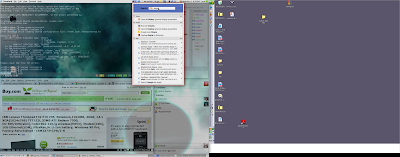Installing FreeBSD 6.1
Installing FreeBSD was a rather painless procedure. I first used a Knoppix disk to resize my windows partition to make some space for FreeBSD, then I booted from the FreeBSD 6.0 installer disk. Installation is fairly painless if you pick the standard installation because it goes step-by-step. BSD uses one slice (what we normally think of as partitions) for it everything. It then divides that slice into sub-units that it calls partitions (they would be sub-partitions in a linux or windows paradigm). Choosing how much space to give to /, /usr/, etc really depends on what you want to use your system for, so you will have to divide up your slice. There are many good resources including the FreeBSD handbook that can help with that. I will note that I reserved 1GB for swap because I plan to upgrade my RAM later.
If you plan to optimize your system, I highly recommend you install the sources for everything during the installation routine. You can get the latest sources over the internet, but if you don't have access right away, you can still optimize your system using the sources on the installation disk. With the sources installed along with the base system, I set about editing the kernel configuration file which is found at /usr/src/sys/i386/conf/GENERIC. Before editing this file, you should copy it to some other name and edit the new file, so that you can rebuild the GENERIC kernel later if it becomes necessary. The GENERIC kernel includes a lot of drivers for hardware that I don't have, so I customized my kernel for my needs and hardware. You can see my kernel configuration here:Kernel Configuration
After configuring my kernel, I set up some optimizations in /etc/make.conf. You can get a starting file from /usr/share/examples/etc/make.conf. I chose to add the following lines:
CPUTYPE=pentium3m
CFLAGS= -O2 -pipe -funroll-loops
COPTFLAGS= -O -pipe -funroll-loops -ffast-math
After rebuilding my kernel and base system using the procedure outlined in the FreeBSD Handbook, I set about installing the applications I would need using the ports system. After using various linux distributions with their respective package manners, I can really appreciate the ports system. It does a fantastic job of resolving dependencies. There have been times when I have not been able to install applications because of dependency issues, OpenOffice.org in particular, but I have usually been able to resolve those fairly easily with the information provided from the ports system when the failure occurred. Through experience I have learned that if you want to use OpenOffice.org, it is easiest to install the precompiled package after installing X and before installing anything else. Of course, the ports you choose to install may be very different from what I chose. Since I am using FreeBSD as my main desktop machine, I installed X, OpenOffice.org, LaTeX, vim-lite, XMMS, MPlayer for videos, linux-opera for web browsing along with all the plugins. A complete list of the packages I have installed can be found here: Package List
If you plan to optimize your system, I highly recommend you install the sources for everything during the installation routine. You can get the latest sources over the internet, but if you don't have access right away, you can still optimize your system using the sources on the installation disk. With the sources installed along with the base system, I set about editing the kernel configuration file which is found at /usr/src/sys/i386/conf/GENERIC. Before editing this file, you should copy it to some other name and edit the new file, so that you can rebuild the GENERIC kernel later if it becomes necessary. The GENERIC kernel includes a lot of drivers for hardware that I don't have, so I customized my kernel for my needs and hardware. You can see my kernel configuration here:Kernel Configuration
After configuring my kernel, I set up some optimizations in /etc/make.conf. You can get a starting file from /usr/share/examples/etc/make.conf. I chose to add the following lines:
CPUTYPE=pentium3m
CFLAGS= -O2 -pipe -funroll-loops
COPTFLAGS= -O -pipe -funroll-loops -ffast-math
After rebuilding my kernel and base system using the procedure outlined in the FreeBSD Handbook, I set about installing the applications I would need using the ports system. After using various linux distributions with their respective package manners, I can really appreciate the ports system. It does a fantastic job of resolving dependencies. There have been times when I have not been able to install applications because of dependency issues, OpenOffice.org in particular, but I have usually been able to resolve those fairly easily with the information provided from the ports system when the failure occurred. Through experience I have learned that if you want to use OpenOffice.org, it is easiest to install the precompiled package after installing X and before installing anything else. Of course, the ports you choose to install may be very different from what I chose. Since I am using FreeBSD as my main desktop machine, I installed X, OpenOffice.org, LaTeX, vim-lite, XMMS, MPlayer for videos, linux-opera for web browsing along with all the plugins. A complete list of the packages I have installed can be found here: Package List

Comments